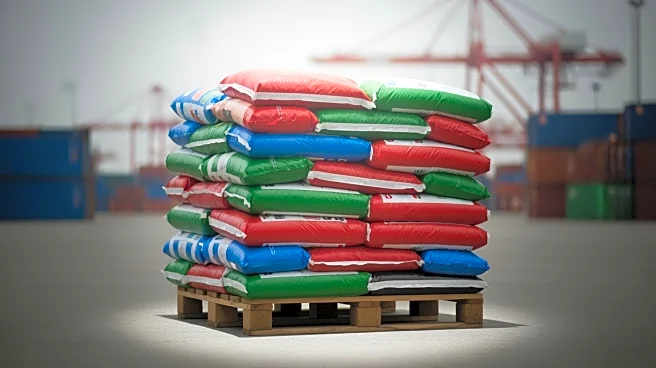What's Happening?
Uralchem Group, a Russian fertilizer manufacturer, has shipped 30,000 tons of potash to Bangladesh as humanitarian aid. This shipment, facilitated by the United Nations World Food Programme, is part of a series of deliveries to developing nations. The
fertilizer was previously stored in Latvia and was stranded due to EU sanctions imposed on Russia following its conflict in Ukraine. Since late 2022, Uralchem has provided approximately 220,000 tonnes of mineral fertilizers to countries facing acute hunger, with shipments reaching nations such as Malawi, Kenya, Nigeria, Zimbabwe, and Sri Lanka.
Why It's Important?
The shipment of fertilizers by Uralchem is significant as it addresses acute hunger in developing countries, highlighting the humanitarian efforts amidst geopolitical tensions. The EU sanctions have left over 400,000 tonnes of Russian fertilizers stranded, impacting global agricultural supply chains. By facilitating these shipments, Uralchem and the United Nations are helping to alleviate food insecurity in regions heavily reliant on agricultural imports. This action underscores the complex interplay between international sanctions and humanitarian needs, potentially influencing future diplomatic and trade negotiations.
What's Next?
The continued collaboration between Uralchem and the United Nations suggests further shipments may be organized to other countries in need. As geopolitical tensions persist, the phased release of stranded fertilizers could become a model for balancing sanctions with humanitarian aid. Stakeholders, including international organizations and governments, may need to reassess strategies to ensure essential goods reach vulnerable populations without compromising political stances.
Beyond the Headlines
This development raises ethical questions about the impact of sanctions on humanitarian aid. While sanctions aim to exert political pressure, they can inadvertently affect civilian populations by restricting access to essential goods. The situation highlights the need for policies that consider humanitarian exceptions, ensuring that aid can be delivered without political interference.















